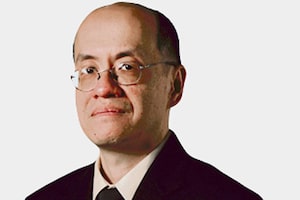Conservative Leader Éric Duhaime, Liberal Leader Dominique Anglade, Québec Solidaire co-spokesperson Gabriel Nadeau-Dubois, Parti Québécois Leader Paul St-Pierre Plamondon, CAQ Leader François Legault and moderator Pierre Bruneau, left to right, stand on the set prior to the leaders debate in Montreal on Sept. 15.Martin Chevalier/The Canadian Press
Coalition Avenir Québec Leader François Legault presented himself as a moderate defender of Quebec taxpayers and the French language in the first debate of the provincial election campaign. In the five-way race defined by cost-of-living and identity issues, Mr. Legault has remained the clear front-runner.
Inflation and immigration took centre stage Thursday in the heated and at times chaotic debate hosted by French-language network TVA. Opposition leaders accused Mr. Legault of being out of touch with middle-class Quebeckers and stirring up xenophobia, while fighting to distinguish themselves in a crowded field.
With an often combative tone, sometimes through gritted teeth, Mr. Legault dismissed criticisms from the left and right, insisting that under his leadership Quebec had “regained its pride,” a favourite theme during his four years as Premier.
“Tonight, the leaders of the opposition tried to convince you that everything is going badly in Quebec,” he said, before boasting of his record on the economy, which has grown faster than neighbouring Ontario’s during his time in office. “Now, the question is, do we want to continue with that momentum for the next four years?”
But his opponents took particular aim at his stand on the environment, another leading issue in this campaign. His party champions the Third Link, a proposed tunnel for automobile traffic between the provincial capital and its south shore suburbs, to supplement the two existing bridges. If the project goes ahead, Quebec’s other efforts to fight climate change will be in vain, said Gabriel Nadeau-Dubois, a co-spokesperson for the leftist Québec Solidaire. “We could all drink our 7 Up with paper straws: If Mr. Legault builds his Third Link, it will negate all our sacrifices.”
Despite landing the occasional blow, Mr. Legault’s four challengers also took aim at each other in an undeclared but widely understood secondary race to form the Official Opposition. Moderator Pierre Bruneau, a veteran journalist, complained that the debate sometimes descended into a “cacophony.” Bitter exchanges between opposition chiefs often removed the bull’s-eye from Mr. Legault’s back.
Éric Duhaime, the leader of the Conservative Party of Québec and a former talk-radio host, flashed his way with words and libertarian convictions, accusing Québec Solidaire of engaging in a “tax striptease” by revealing new levies every day.
“Mr. Duhaime, run for governor of Texas, you’ll fit in,” Mr. Nadeau-Dubois said.
“I’d never insult you and say you ought to run for office in Cuba,” Mr. Duhaime countered.
Economic growth, a reassuring style during the pandemic and nationalist rhetoric have made Mr. Legault a dominant figure in provincial politics, with many polls giving him a roughly 20-point lead over his closest rivals. Bills 21 and 96 – which ban certain civil servants from wearing visible religious symbols on the job and limit the use of English in the public sphere, respectively – have faced court challenges and outrage from minority groups but remain broadly popular.
The traditional federalist and sovereigntist parties, the Liberal Party of Quebec and the Parti Québécois, have languished in recent years as the question of independence fades from view. Liberal Leader Dominique Anglade and her PQ counterpart, Paul St-Pierre Plamondon – both relatively new to their posts – have failed to make a strong impression on voters.
The partisan landscape is further splintered by the presence of Québec Solidaire, which wants to make Quebec “one of the greenest countries in the world,” and the Conservative Party, which gained popularity by opposing public-health restrictions during the pandemic.
Mr. Legault often presented himself as a centrist alternative to his dogmatic opponents during the debate. On the subject of public safety and a wave of dramatic shootings in Montreal, he said to the separatist Mr. Plamondon, “What you want to do is have a referendum on sovereignty to fix the problem of guns.”
He later attacked Conservative plans for private health care by saying they were “only for the rich.” Mr. Legault has proposed to allow the construction of private “mini-hospitals” to take pressure off the health care system but insists that services provided there will be covered by public health insurance.
Opposition leaders challenged Mr. Legault from the left and right on immigration. The number of newcomers Quebec should admit annually – using its power to choose economic immigrants, unique among the provinces – has become a source of heated debate during the campaign. Mr. Legault’s party would reduce it from 70,000 to 50,000 in an effort, he says, to protect the French language and preserve “national cohesion.”
Still, Mr. Plamondon accused the CAQ Leader of having “lost control of immigration.” The Parti Québécois would lower the number even further, to 35,000. Also on Mr. Legault’s right, Mr. Duhaime said Quebec should screen immigrants to ensure they respect Western values and clamp down on “illegal” entries.
Ms. Anglade, the daughter of immigrants from Haiti, accused Mr. Legault of equating violence and immigration, a conflation he seemed to make earlier in the campaign, and said she would maintain the immigrant number at 70,000 to help combat the labour shortage.
Mr. Legault responded by striking a warmer and more moderate tone on the subject. “Immigration is a source of wealth,” he said. “Nothing makes me happier than to see a newcomer who integrates into our nation.”
Both Mr. Duhaime and Mr. Legault were clearly attempting to chip away at support for the Liberals, the traditional political home of anglophone Quebeckers. Mr. Legault made an appeal to federalist voters. “The Liberal Party has lost its monopoly over those who are against Quebec sovereignty.”
Mr. Duhaime, for this part, attacked Ms. Anglade’s stand on Bill 96, the language law.
The Liberals initially proposed amendments that would require students in English-language junior colleges (CEGEPs) to take three program-related courses in French. However, the party later voted against the legislation.
“You betrayed English Quebeckers on that bill,” Mr. Duhaime said, slipping an English soundbite into a French-language debate.
There will be no English-language debate in this election campaign because Mr. Legault refused to participate in one, saying he didn’t have time.
Public broadcaster Radio-Canada will host a second debate on Sept. 22. The election is on Oct. 3.
 Eric Andrew-Gee
Eric Andrew-Gee Tu Thanh Ha
Tu Thanh Ha